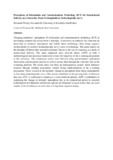Please use this identifier to cite or link to this item:
https://cris.library.msu.ac.zw//handle/11408/3441Full metadata record
| DC Field | Value | Language |
|---|---|---|
| dc.contributor.author | Govender, Desmond Wesley | - |
| dc.contributor.author | Chitanana, Lockias | - |
| dc.date.accessioned | 2019-02-08T12:31:10Z | - |
| dc.date.available | 2019-02-08T12:31:10Z | - |
| dc.date.issued | 2016 | - |
| dc.identifier.issn | 1936-0282 | - |
| dc.identifier.uri | https://digitalcommons.kennesaw.edu/ajis/vol8/iss2/4/ | - |
| dc.identifier.uri | http://hdl.handle.net/11408/3441 | - |
| dc.description.abstract | Changing academics’ perceptions of information and communications technology (ICT) in developing countries has always been a challenge. A university in Zimbawe has witnessed an about-turn in lecturers’ perceptions and beliefs about technology, from being negative (technophobic) to positive (technologically savvy) users of technology. This paper reports on the interplay of factors that resulted in lecturers’ buy-in to the use of e-learning as a mode of instructional delivery. The study employed actor network theory (ANT) as both a methodological and analytical framework to trace the trajectory of the e-learning programme at this university. The conspicuous actors were followed using questionnaires, participant observation, and document analysis as well as tracing them through the trails they left on the e-learning platform. The results show that there are heterogeneous actants which influence lecturers through multiple associations created during implementation of the e-learning programme. These resulted in the lecturers’ change in perceptions from being technophobic to becoming technologically savvy. This article contributes to the growing body of literature that uses ANT to understand e-learning as a socio-technical process. ANT’s contribution to explaining the change in lecturers’ perceptions lies in its symmetrical power to consider technological developments and human capacity development as equal actants that can exert similar levels of influence on each other to bring about required change. | en_US |
| dc.language.iso | en | en_US |
| dc.publisher | Kennesaw State University | en_US |
| dc.relation.ispartofseries | The African Journal of Information Systems;Vol. 8, No. 2: p. 70-85 | - |
| dc.subject | Information and communication technology | en_US |
| dc.subject | Technophobic | en_US |
| dc.title | Perceptions of Information and Communications Technology (ICT) for instructional delivery at a university: from technophobic to technologically savvy | en_US |
| dc.type | Article | en_US |
| item.openairetype | Article | - |
| item.grantfulltext | open | - |
| item.cerifentitytype | Publications | - |
| item.fulltext | With Fulltext | - |
| item.openairecristype | http://purl.org/coar/resource_type/c_18cf | - |
| item.languageiso639-1 | en | - |
| Appears in Collections: | Research Papers | |
Files in This Item:
| File | Description | Size | Format | |
|---|---|---|---|---|
| Perceptions of Information and Communications Technology.pdf | Abstract | 102.82 kB | Adobe PDF |  View/Open |
Page view(s)
230
checked on Dec 11, 2025
Download(s)
92
checked on Dec 11, 2025
Google ScholarTM
Check
Items in MSUIR are protected by copyright, with all rights reserved, unless otherwise indicated.



